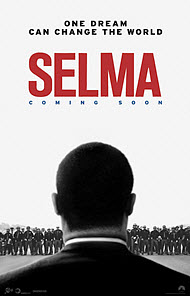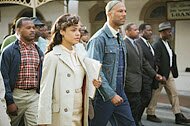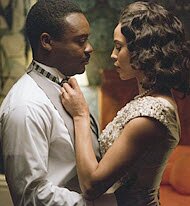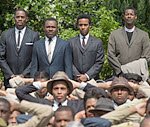 Oscar® Nominee for Best Picture, Original song—“Glory”
Oscar® Nominee for Best Picture, Original song—“Glory”Selma
 for disturbing thematic material including violence, a suggestive moment, and brief strong language.
for disturbing thematic material including violence, a suggestive moment, and brief strong language.
Reviewed by: Brian C. Johnson
CONTRIBUTOR
| Moral Rating: | Offensive (due to language) |
| Moviemaking Quality: |
|
| Primary Audience: | Adults Teens |
| Genre: | Political History Drama |
| Length: | 2 hr. 2 min. |
| Year of Release: | 2014 |
| USA Release: |
December 25, 2014 (limited—19 theaters) January 9, 2015 (wide—2,179 theaters) January 16, 2015 (2,235) DVD: May 5, 2015 |





RACISM—What are the consequences of racial prejudice and false beliefs about the origin of races? Answer
being willing to die for what you believe in
1960s African—American Civil Rights Movement
Selma to Montgomery marches that led to the passage of the 1965 Voting Rights Act
Dr. Martin Luther King Jr. (Wikipedia)
President Lyndon B. Johnson
civil rights marches
nonviolent demonstrations versus riots
civil disobedience
Governor George Wallace
Southern Christian Leadership Conference
White supremacists
| Featuring |
David Oyelowo … Martin Luther King Jr. Martin Sheen … Frank Minis Johnson Dylan Baker … J. Edgar Hoover Tom Wilkinson … President Lyndon B. Johnson Giovanni Ribisi … Lee C. White Cuba Gooding Jr. … Fred Gray Tim Roth … George Wallace Alessandro Nivola … John Doar Carmen Ejogo … Coretta Scott King Oprah Winfrey … Annie Lee Cooper Wendell Pierce … Reverend Hosea Williams Tessa Thompson … Diane Nash Common … James Bevel Lorraine Toussaint … Amelia Boynton Niecy Nash … Richie Jean Jackson Keith Stanfield … Jimmie Lee Jackson See all » |
| Director |
Ava DuVernay |
| Producer |
Cloud Eight Films Celador Films See all » |
| Distributor |
 Paramount Pictures Corporation, a subsidiary of ViacomCBS |
On December 10, 1964, the Rev. Dr. Martin Luther King, Jr., addressed the world as the recipient of the Nobel Peace Prize. King begins,
“I accept the Nobel Prize for Peace at a moment when 22 million Negroes of the United States of America are engaged in a creative battle to end the long night of racial injustice. I accept this award on behalf of a civil rights movement which is moving with determination and a majestic scorn for risk and danger to establish a reign of freedom and a rule of justice.”
So begins director Ava DuVernay’s “Selma.” Standing on the stage in Oslo, Norway, King (David Oleyowo) shares his concern for the people of the American South who have ben denied such basic human rights essentially afforded to them by the Constitution of the United States, namely the right to vote.
Just as Gettysburg was a pivotal moment in the turning of the Civil War, Selma, Alabama was the tipping point of the American Civil Rights Movement. Much has happened since the Montgomery Bus Boycott had changed the public transit system. Organizations like the Southern Christian Leadership Conference (SCLC) and the Student Non-Violent Coordinating Committee (SNCC) had made tremendous efforts to destabilize the status quo of maltreatment of black citizens. King and his colleagues had effectively garnered support for societal change, but King realized that significant federal legislation, specifically voting rights protections, would only happen if the entire nation’s consciousness was raised. He needed President Lyndon Johnson to use the power of the Oval Office to enforce freedom and justice for all.
“Selma” is a victorious film that reintroduces our nation to its own history, especially the strategic nature of the Civil Rights Movement. The film is successful in its depictions of the complexities of figuring out the “right” thing to do as well as the rivalries between the big personalities of those involved, including Johnson himself (Tom Wilkinson). Wilkinson’s portrayal of Johnson has been questioned and panned in popular social media. LBJ was a politician, just like Lincoln, who acted in his own political best interest—and only when his hand was forced. The film also accurately examines the internal conflicts within the leaders of the movement including James Farmer and John Lewis.
It explores King’s “competition” with Malcolm X and the hatred he faced from the likes of the FBI’s director J. Edgar Hoover (Dylan Baker) and Governor George Wallace (Tim Roth). DuVernay also takes on the long-held belief that King had dalliances with other women beside his wife Coretta (Carmen Ejogo).
It is violent and gut-wrenching, but it truthful in its use of violence. The film especially confronts the violence of “Bloody Sunday,” the moniker used to describe the actions of the law enforcement officers who led an all-out assault on the non-violent, passive resistors. The film is brilliant for how it connects the Selma of 1964 to our present-day national discussions on race and the criminal justice system (e.g., Ferguson, MO). It is tough to watch, but eye-opening.
In my opinion, “Selma” is a must-see film. In his real life, Dr. King appealed specifically to the body of Christ to not be complacent in their duty to act to change a society for the betterment of all. “Selma” does the same thing—this is a call to action. What will YOU do to insert the love of Christ into a broken world?
Violence: Heavy to extreme / Profanity: Heavy—“G*d-d*mn” (5), “Oh my Lord” (2), “How in Chr*st’s sakes?”, “J*sus H. Chr*st,” “d*mn” (7), “hell” (3), *ss (2), f-words (2), s-words (7), SOB / Sex/Nudity: Moderate—contents of harrassing phone message (no nudity)
RACISM—What are the consequences of racial prejudice and false beliefs about the origin of races? Answer
 Get biblical answers to racial hot-topics. Where did the races come from? How did skin color come about? Why is it important to have a biblical foundation for such issues?
Get biblical answers to racial hot-topics. Where did the races come from? How did skin color come about? Why is it important to have a biblical foundation for such issues?
See list of Relevant Issues—questions-and-answers.


A lot of attention is paid to relationships between the characters involved, as well as issues involved in nonviolently challenging a long existing and well accepted evil. We are also called to bravery in the face of wrongdoing.
The religious community comes out looking pretty good for its role. There is some controversy about the historical accuracy of how LBJ is depicted (some of King’s earlier relationship to Kennedy and his later conflict with LBJ about Vietnam may have been mixed into the film, as well as FDR’s famous statement to supporters “you want me to pass this, make me do it” which is what happens in the film.). See all »
Moral rating: Excellent! / Moviemaking quality: 4½
The acting was superb (Oyewolo TRANSFORMED!), and the story is a vivid reminder that we are way more alike than we realize: ALL of us—black, white, brown, yellow, red—want to be treated with dignity and respect. See all »
Moral rating: Excellent! / Moviemaking quality: 5
It’s good that this film was rated PG-13 and Not R, nothing too morally offensive in this film. My two best friends and I after seeing this film were asking ourselves, when will Hollywood make a movie to Honor the Life and beliefs of the late Brooklyn born Rabbi Meir Kahane 1932-1990 born Martin David Kahane. Many have compared Meir Kahane to Malcolm X. All in all, “Selma” was one of the best films of 2014. A movie that all American citizens of all races should watch, so that we don’t make the same mistakes of the past and work together towards a better future.
Moral rating: Better than Average / Moviemaking quality: 4
There are touching scenes of Coretta Scott King fearing for her family’s safety, and confronting MLK on his extra-marital affairs, but this was all done with implying the affairs, not actually showing them.
The only real bad taste left in my mouth was in staying through the credits at the end of the movie, accompanied by a hip hop track that, quite tastelessly, had a line in it comparing the shooting of Michael Brown in Missouri as somehow now the next compelling civil rights issue—c’mon, that is a dramatically different situation from the civil rights issues of MLK’s time, and it was a cheap shot, IMO, to insert it into the film’s soundtrack given the careful decision of the Grand Jury.
Moral rating: Better than Average / Moviemaking quality: 4
I would have enjoyed the movie ten million times more had Oprah not been in as many scenes as she was (even to the point of her character being in decision making scenes with King and his advisors)? Oprah is all about Oprah and she spends her money accordingly. Most of it is for good; it is just that her contributions are well advertised to benefit her name as well. I have no doubt she insisted on being in as many scenes as she was. That alone bugged me to the point of not enjoying the movie as much as I should have.
Moral rating: Good / Moviemaking quality: 4
The song “Glory” by John Legend and Common, touched me; it gave me chills when I heard it. The film deserved more than just a nomination for Best Film and Original Song for the Academy Awards. It deserved for Best Actor, Director, Screenplay, Photography, Best Supporting Actress. This is a cinamatic masterpiece. I give it my acclaim, because it deserves it.
If you want to show a film about a man of God who changed history with God on his side. “Selma” is that film. A must see film.
Moral rating: Excellent! / Moviemaking quality: 5
Artistic license is not a license to lie. Some of the historical inaccuracies are as follows:
1. The total absence of Dr. Ralph Abernathy who was always at Dr. Kings side during the entire civil rights struggle.
2. Replacing the two Jewish Rabbis with two Catholic Priests, not to Disparage Catholic Priest for both Catholic Priest and Rabbis were heavily involved in the civil rights movement.
3. Implying that Johnson authorized the leaking of tapes of King’s impropriety when in fact is was Jack Kennedy for this leak occurred before Johnson became president.
4. From the time he was sworn in Johnson sought the implementation of the Civil Rights and Voting Rights Act.
5. Johnson did not oppose the Selma march, some historians indicate that he used the brutal results as and way to move it through and have it enacted by congress.
6. Witnesses still alive and history books establish there were not animosities between Johnson and King in the White House meeting.
If you want to see the movie, good. I myself plan to see it, but don’t to take this movie as gospel, and it is best watched after you have done some historical research and if you can watch the newsreels of the actual Selma march. It may be a well made and quality movie, but that makes it even more harmful to the study of history. Many time the best well-made movie and quality movies may do a effective job of distorting history.
PLEASE share your observations and insights to be posted here.
There were a number of moments when I was brought to tears by the painful events depicted in this movie. I remember seeing these events on television news. I appreciated that the filmmakers inserted historic footage of the march, making the reality of this fight for freedom and justice even more real and moving.
There were quite a lot of remarkable performances, including Tim Roth as Governor George Wallace and Tom Wilkinson as President Lyndon Johnson.
I am glad I saw this film, as painful as it was to see the hideous violence, because it helped me remember Martin Luther King’s passion for justice and human rights. What a terrible and violent period in American history. I thought about my schoolmates who were somewhere in that historic footage as they marched for a better America.
My Ratings: Moral rating: / Moviemaking quality: 4